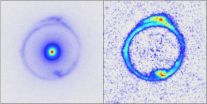(Press-News.org) It happens innocently enough: One minute you're sitting at your desk, working on a report, and the next minute you're thinking about how you probably need to do laundry and that you want to try the new restaurant down the street. Mind wandering is a frequent and common occurrence. And while mind wandering in certain situations – in class, for example – can be counterproductive, some research suggests that mind wandering isn't necessarily a bad thing.
New research published in the journals of the Association for Psychological Science explores mind wandering in various contexts, examining how mind wandering is related to cognitive processes involved in working memory and executive control.
Inspired by Distraction: Mind Wandering Facilitates Creative Incubation
You might be driving home from work, taking a shower, preparing ingredients for dinner and, suddenly – "Eureka!" – you have a new insight into some problem or situation. Anecdotes tell us that people often have these kinds of creative thoughts while engaged in unrelated tasks, but researcher Benjamin Baird and colleagues wanted to subject the phenomenon to scientific scrutiny. The researchers designed an experiment in which they asked participants to perform an Unusual Use Task (UUT), listing as many unusual uses for an item as possible. The participants were then split into four groups – one group was asked to perform a demanding task and a second was asked to perform an undemanding task. The third group rested for 12 minutes and a fourth group was given no break. All participants then performed the Unusual Use Task again. Of the four groups, only the people who performed the undemanding task improved their score on the second UUT test. Participants in the undemanding task reported greater instances of mind wandering during the task, which suggests that simple tasks that allow the mind to wander may increase creative problem solving.
Corresponding author: Benjamin Baird – University of California, Santa Barbara – baird@psych.ucsb.edu
Published online in Psychological Science
What Mind Wandering Reveals About Executive-Control Abilities and Failures
While mind wandering might lead to creative insights, involuntary mind wandering can also take us away from the important activities and tasks at hand. In this article, Kane and McVay discuss the relationships among working memory, task-unrelated thoughts, and task performance. Using both laboratory-based and daily-life assessments, research has shown that people with lower working memory capacity are more likely to mind wander, at least during demanding tasks. This propensity to mind wandering may partly explain why people with lower working memory capacity are also more likely to make errors. Kane and McVay argue that involuntary mind wandering can provide psychological scientists with a unique window into aspects of the mind's mechanisms for cognitive control, including how, when, and for whom these mechanisms fail.
Corresponding author: Michael Kane – University of North Carolina at Greensboro – mjkane@uncg.edu
Published in Current Directions in Psychological Science
The Persistence of Thought: Working Memory May Help to Maintain Task-Unrelated Thinking
Our working memory acts as a sort of mental workspace that allows us to juggle multiple thoughts simultaneously, but what role does it play in mind wandering? Does working memory inhibit or support off-task thinking? Psychological scientist Daniel Levinson and colleagues decided to put this issue to the test. They asked volunteers to perform one of two simple tasks — either pressing a button in response to the appearance of a certain letter on a screen, or simply tapping in time with one's breath — and compared people's propensity to drift off. In both tasks, people with higher working memory capacity reported more mind wandering during the tasks, even though their performance on the test wasn't compromised. But when the volunteers were given a comparably simple task that was filled with sensory distractors, the relationship between working memory and mind wandering disappeared. These results suggest that working memory may ultimately reflect underlying priorities, enabling off-topic thoughts when we don't have many other things to keep in mind.
Corresponding author: Daniel Levinson – University of Wisconsin-Madison – dblevinson@wisc.edu
Published in Psychological Science
Rest Is Not Idleness: Implications of the Brain's Default Mode for Human Development and Education
Mary Helen Immordino-Yang, Joanna A. Christodoulou, and Vanessa Singh
While moments for reflection may be hard to come by, some research suggests that the long-lost art of introspection — from mind wandering to focused reflection — may be an increasingly valuable part of life. In this article, psychological scientist Mary Helen Immordino-Yang and colleagues survey the existing scientific literature from neuroscience and psychological science, exploring what it means when our brains are 'at rest.' Immordino-Yang and her colleagues believe that research on the brain at rest can yield important insights into the importance of reflection and quiet time for learning.
Corresponding author: Mary Helen Immordino-Yang – University of Southern California – immordin@usc.edu
Published in Perspectives on Psychological Science
###
Please contact Anna Mikulak at 202-293-9300 or amikulak@psychologicalscience.org for more information.
More than just 'zoning out' -- Exploring the cognitive processes behind mind wandering
2012-10-12
ELSE PRESS RELEASES FROM THIS DATE:
Duke Medicine news -- Anti-cancer drug fights immune reaction in some infants with Pompe disease
2012-10-12
DURHAM, N.C. – Adding a third anti-cancer agent to a current drug cocktail appears to have contributed to dramatic improvement in three infants with the most severe form of Pompe disease -- a rare, often-fatal genetic disorder characterized by low or no production of an enzyme crucial to survival.
Duke researchers previously pioneered the development of the first effective treatment for Pompe disease via enzyme replacement therapy (ERT). ERT relies on a manufactured enzyme/protein to act as a substitute for the enzyme known to be lacking in patients with a particular disease. ...
New studies reveal connections between animals' microbial communities and behavior
2012-10-12
Athens, Ga. – New research is revealing surprising connections between animal microbiomes—the communities of microbes that live inside animals' bodies—and animal behavior, according to a paper by University of Georgia ecologist Vanessa O. Ezenwa and her colleagues. The article, just published in the Perspectives section of the journal Science, reviews recent developments in this emerging research area and offers questions for future investigation.
The paper grew out of a National Science Foundation-sponsored workshop on new ways to approach the study of animal behavior. ...
Enzyme triggers cell death in heart attack
2012-10-12
University of Iowa researchers have previously shown that an enzyme called CaM kinase II plays a pivotal role in the death of heart cells following a heart attack or other conditions that damage or stress heart muscle. Loss of beating heart cells is generally permanent and leads to heart failure, a serious, debilitating condition that affects 5.8 million people in the United States.
Now the UI team, led by Mark Anderson, M.D., Ph.D., professor and head of internal medicine at the UI Carver College of Medicine, has honed in on how CaM kinase II triggers heart cell death ...
New treatments for epilepsy, behavioral disorders could result from Wayne State studies
2012-10-12
Three studies conducted as part of Wayne State University's Systems Biology of Epilepsy Project (SBEP) could result in new types of treatment for the disease and, as a bonus, for behavioral disorders as well.
The SBEP started out with funds from the President's Research Enhancement Fund and spanned neurology, neuroscience, genetics and computational biology. It since has been supported by multiple National Institutes of Health-funded grants aimed at identifying the underlying causes of epilepsy, and it is uniquely integrated within the Comprehensive Epilepsy Program at ...
Safety results of intra-arterial stem cell clinical trial for stroke presented
2012-10-12
HOUSTON – (Oct. 11, 2012) – Early results of a Phase II intra-arterial stem cell trial for ischemic stroke showed no adverse events associated with the first 10 patients, allowing investigators to expand the study to a targeted total of 100 patients.
The results were presented today by Sean Savitz, M.D., professor of neurology and director of the Stroke Program at The University of Texas Health Science Center at Houston (UTHealth), at the 8th World Stroke Congress in Brasilia, Brazil.
The trial is the only randomized, double-blind, placebo-controlled intra-arterial clinical ...
Satellite sees 16th Atlantic tropical depression born near Bahamas
2012-10-12
The 16th tropical depression of the Atlantic Ocean season has formed northeast of the Bahamas and NOAA's GOES-14 satellite captured a visible image of the storm as it tracks to the southwest.
NOAA's GOES-14 satellite captured a visible image of newborn Tropical Depression 16 (TD16) near the Bahamas on Oct. 11 at 7:45 a.m. EDT. TD16 appeared as a rounded area of clouds just northeast of the Bahamas and its western fringes were just off the Florida east coast. GOES-14 also showed another low pressure area with the potential for development a few hundred miles from the Windward ...
NASA sees Typhoon Prapiroon doing a 'Sit and Spin' in the Philippine Sea
2012-10-12
As Typhoon Prapiroon slowed down and became quasi-stationary in the Philippine Sea NASA's Terra satellite passed overhead and captured an image of the storm.
NASA's Terra satellite passed over Typhoon Prapiroon on Oct. 11 at 0210 UTC (1010 p.m. EDT, Oct. 10) and the Moderate Resolution Imaging Spectroradiometer (MODIS) instrument captured a visible image of the storm. The visible imagery clearly showed a small ragged eye, and microwave satellite imagery confirmed the eye. Satellite imagery also confirmed a well-defined low-level center of circulation.
By 11 a.m. EDT ...
Nurture trumps nature in study of oral bacteria in human twins, says CU study
2012-10-12
A new long-term study of human twins by University of Colorado Boulder researchers indicates the makeup of the population of bacteria bathing in their saliva is driven more by environmental factors than heritability.
The study compares saliva samples from identical and fraternal twins to see how much "bacterial communities" in saliva vary from mouth to mouth at different points in time, said study leader and CU-Boulder Professor Kenneth Krauter. The twin studies show that the environment, rather than a person's genetic background, is more important in determining the ...
When galaxies eat galaxies
2012-10-12
SALT LAKE CITY, Oct. 11, 2012 – Using gravitational "lenses" in space, University of Utah astronomers discovered that the centers of the biggest galaxies are growing denser – evidence of repeated collisions and mergers by massive galaxies with 100 billion stars.
"We found that during the last 6 billion years, the matter that makes up massive elliptical galaxies is getting more concentrated toward the centers of those galaxies. This is evidence that big galaxies are crashing into other big galaxies to make even bigger galaxies," says astronomer Adam Bolton, principal ...
Exposure to traffic air pollution in infancy impairs lung function in children
2012-10-12
Exposure to ambient air pollution from traffic during infancy is associated with lung function deficits in children up to eight years of age, particularly among children sensitized to common allergens, according to a new study.
"Earlier studies have shown that children are highly susceptible to the adverse effects of air pollution and suggest that exposure early in life may be particularly harmful," said researcher Göran Pershagen, MD, PhD, professor at the Karolinska Institutet Institute of Environmental Medicine in Stockholm, Sweden. "In our prospective birth cohort ...


